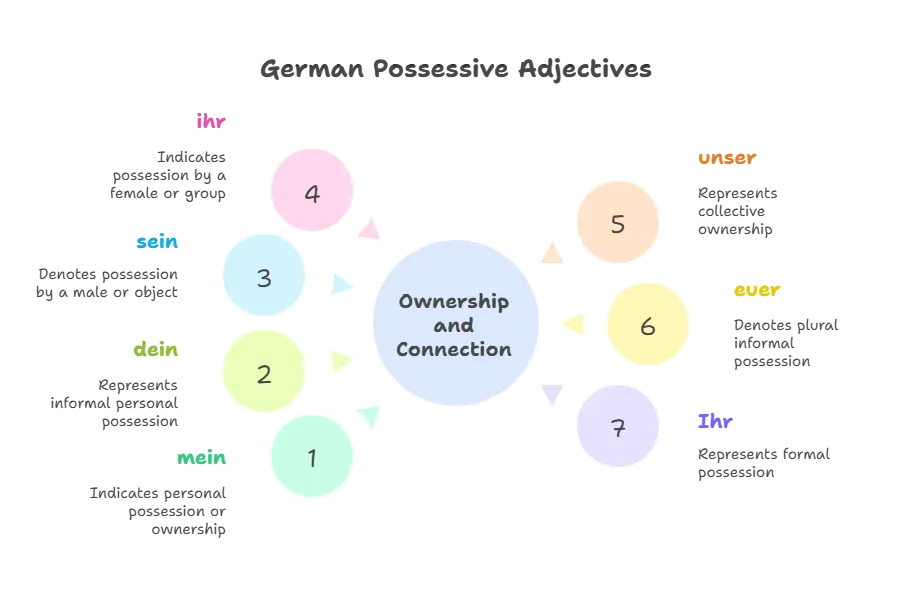Table of Contents
Possessive adjectives are used when you are the owner of something or when you are aware of who owns something. For example, in German, they make it simpler to explain who owns a phrase or what they are linked to by making the connections between people and things more evident. The phrase “Mein Buch,” for instance, meaning “my book,” makes it quite apparent who the owner of the book is.
Master the German Language with Entri App! Click Here for Free Trial Class!
Importance of ownership expressions
The usage of possessive adjectives is crucial since they clearly indicate ownership or association. This elucidates the significance of possessive adjectives. In their absence, obtaining a clear understanding of the relationships among the several individuals and entities inside a word would be difficult. The term “mein Hund” indicates ownership, but just mentioning “Hund” does not clarify to whom the dog belongs. Consequently, people may interact with one another more efficiently and with less mistakes.
What are German possessive adjectives?
1: How do you say "Good Morning" in German?
German possessive adjectives denote ownership or a link between an individual and a term. They denote possession, akin to “my,” “your,” or “their” in English. Prevalent German possessive adjectives comprise:
- mein – mine
- dein – your (informal)
- sein – his/its
- ihr – her/their
- unser – our
- euer – your (plural, casual)
- Ihr – your (formal)
|
Goethe 2025 Exam Dates: Multiple Centers |
|
| Trivandrum Goethe Exam Dates | Kochi Goethe Exam Dates |
| Chennai Goethe Exam Dates | Coimbatore Goethe Exam Dates |
Free German A1 Mock Tests – Powered by AI!
Test your skills on our interactive platform. Get instant feedback from our AI to help you communicate better and track your progress. Start your free German mock test now.
Test Your German A1 for FreeHow do they change with gender and case?
When describing a noun in German, possessive adjectives are required to correspond with the noun’s gender (masculine, feminine, or neuter), number (single or multiple), and case (nominative, accusative, dative, or genitive). This indicates that the ending of the possessive adjective changes based on the elements that are being considered.
Illustrations of the word “mein” (my):
1. A masculine noun, Vater, which means “father”
“My Father” is the nominative form of “my Father.”
meinen Vater is an accusative phrase that means “I see my father.”
The dative form of the phrase “I give my father a gift” is “my father.”
The book that was written by my father is referred to as my father’s book.
2. The feminine noun “Mutter” (which means “mother”)
My mother, often known as my Mutter, is the nominative:
My mother is the accusative form of the phrase “I see my mother.”
The dative form of the phrase “my mother” is “I give my mother a gift.”
My mother’s counsel is used as a genitive form of the phrase “my mother.”
3. A neutral noun in the sense of “kind” (child)
“Mein Kind” is the nominative form of “my child.”
My Kind is an accusative phrase that means “I see my child.”
Meinem Kind is a dative form that means “I give my child a toy.”
Meines Kindes is a contraction of the phrase “the toy of my child.”
4. Friends, also known as Freunde, is a plural noun.
Meine Freunde is the correct nominative form of my pals.
Meine Freunde is an accusative phrase that means “I see my friends.”
“my friends” is a German phrase that means “I give gifts to my friends.”
The plans of my friends are included inside the genitive phrase “my friends.”
Declension Table: mein, dein, etc.
| Case
|
Masculine | Feminine | Neuter | Plural |
| Nominative | mein / dein / sein / ihr / unser / euer / Ihr | meine / deine / seine / ihre / unsere / eure / Ihre | mein / dein / sein / ihr / unser / euer / Ihr | meine / deine / seine / ihre / unsere / eure / Ihre |
| Accusative | meinen / deinen / seinen / ihren / unseren / euren / Ihren | meine / deine / seine / ihre / unsere / eure / Ihre | mein / dein / sein / ihr / unser / euer / Ihr | meine / deine / seine / ihre / unsere / eure / Ihre |
| Dative | meinem / deinem / seinem / ihrem / unserem / eurem / Ihrem | meiner / deiner / seiner / ihrer / unserer / eurer / Ihrer | meinem / deinem / seinem / ihrem / unserem / eurem / Ihrem | meinen / deinen / seinen / ihren / unseren / euren / Ihren |
| Genitive | meines / deines / seines / ihres / unseres / eures / Ihres | meiner / deiner / seiner / ihrer / unserer / eurer / Ihrer | meines / deines / seines / ihres / unseres / eures / Ihres | meiner / deiner / seiner / ihrer / unserer / eurer / Ihrer |
Example sentences across cases
If you see German possessive adjectives in action, you may be able to comprehend them better. The case, number, and gender of the noun determine how these adjectives terminate. Since the examples below demonstrate how to use “mein” (my) in every circumstance, it is simpler to understand and use appropriately.
Nominative (subject of the sentence)
-
Masculine: Mein Vater ist Lehrer. → My father is a teacher.
-
Feminine: Meine Mutter kocht. → My mother is cooking.
-
Neuter: Mein Kind spielt im Garten. → My child is playing in the garden.
-
Plural: Meine Freunde sind hier. → My friends are here.
Accusative (direct object)
-
Masculine: Ich sehe meinen Vater. → I see my father.
-
Feminine: Ich rufe meine Mutter an. → I call my mother.
-
Neuter: Ich finde mein Kind im Park. → I find my child in the park.
-
Plural: Ich besuche meine Freunde. → I visit my friends.
|
German A2 Exercises – Download Free PDF |
||
Dative (indirect object)
-
Masculine: Ich gebe meinem Vater ein Geschenk. → I give my father a gift.
-
Feminine: Ich danke meiner Mutter. → I thank my mother.
-
Neuter: Ich erzähle meinem Kind eine Geschichte. → I tell my child a story.
-
Plural: Ich helfe meinen Freunden. → I help my friends.
Genitive (possession)
-
Masculine: Das Auto meines Vaters ist neu. → My father’s car is new.
-
Feminine: Die Ratschläge meiner Mutter sind hilfreich. → My mother’s advice is helpful.
-
Neuter: Das Spielzeug meines Kindes ist kaputt. → My child’s toy is broken.
-
Plural: Die Bücher meiner Freunde sind spannend. → My friends’ books are exciting.
Master the German Language with Entri App! Click Here for Free Trial Class!
Free German A1 Mock Tests – Powered by AI!
Test your skills on our interactive platform. Get instant feedback from our AI to help you communicate better and track your progress. Start your free German mock test now.
Test Your German A1 for FreeWhat’s the difference between “ihr” and “Ihr”?
Depending on the context, the word “ihr” (with a lowercase “i”) might signify either her or their:
Her: Das ist ihr Buch. => That is the title of her book.
This is their home, as the phrase “Das ist ihr Haus” translates to.
In the context of formally addressing one or more individuals, the formal “your” is referred to as “Ihr” (capital “I”):
Your automobile is referred to as “Das ist Ihr Auto.” (official)
Conclusion
For the purpose of showing ownership and connections, possessive adjectives in German are very important. It is important to master them since they alter depending on the gender, number, and case of the noun that they describe. This guarantees that communication is both clear and correct. One way to minimize misunderstanding and improve the precision and naturalness of your German is to have an understanding of the nuances, such as the difference between ihr and Ihr.
Free German A1 Mock Tests – Powered by AI!
Test your skills on our interactive platform. Get instant feedback from our AI to help you communicate better and track your progress. Start your free German mock test now.
Test Your German A1 for FreeFrequently Asked Questions
Are German possessive adjectives always placed before the noun?
Yes, they always come directly before the noun they modify.
Do all possessive adjectives follow the same declension pattern?
es, adjectives like mein, dein, sein, ihr, unser, euer, Ihr follow the same pattern of endings.
Can possessive adjectives be used for objects, not just people?
Yes. For example: mein Auto (my car), dein Buch (your book).
What is the easiest way to learn all endings?
Using a declension table and practicing with example sentences helps memorize the correct endings.












